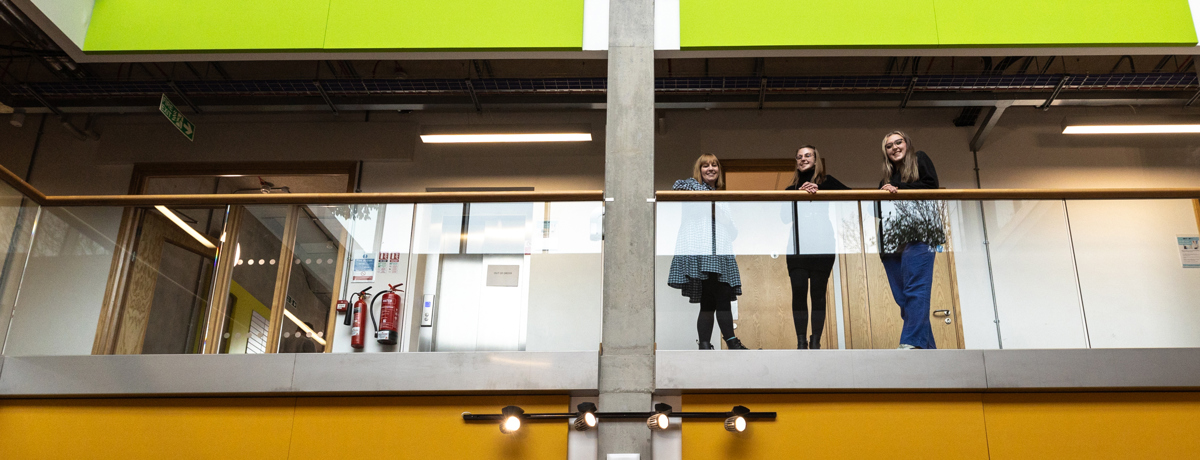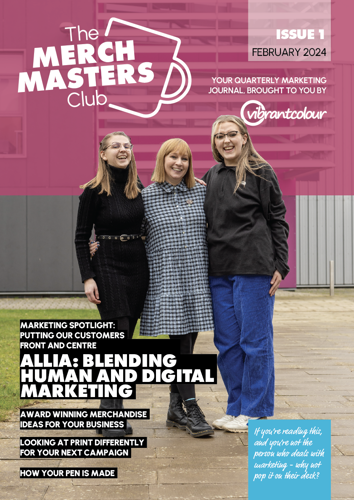Sophie Fryer calls her umbrellas umbre-allias. It’s a portmanteau of umbrella, naturally, and Allia, the charity she works for. “We’ve got umbrella stands in all of our buildings,” the senior marketing officer explains, who likes to watch out for people using them. Jem Collins meets the team...

“Occasionally you see someone from the office just walking down with their umbre-allia and you’re like ‘oooh umbre-allia!’” While the branded umbrellas are technically there to give a professional touch, the way Sophie describes them hints at something more fundamental to the organisation’s marketing – human connection.
Founded in 1999, the charity, which mainly operates from Cambridge, Peterborough and London. has a wide remit.
Not only does Allia run tailored venture support programmes to help small businesses and charities grow, it also offers flexible workspaces and ethical finance. What’s more, the organisations it helps range from entrepreneurs-to-be to fully-fledged SMEs.
“Our offer isn’t a simple one,” Sophie agrees, “we have a number of different services to promote, so we try to simplify our comms and make our messages stand out to the different target audiences we need to hit.”
The online and offline strategy delivered by the team of three also focuses on key social channels like LinkedIn and Instagram and their own suite of websites.
But, even in the digital world, the focus is on connecting people.
Speaking about their Meta ad campaigns, which Sophie says are particularly valuable, she explains: “Instead of just sending people to a website, we collect the person’s name and number and we have a conversation with them.
“We found that the conversion rates work better – it makes the journey a bit long, but actually having a conversation with one of our venture support team enables that person to find out more about how the programme can help their business and how we can tailor our services to them.”
"Even the umbre-allias are a chance to spark a conversation"
Laura Rose, group head of marketing communications, says it’s an ethos that also steers the kind of social content they make too. “For Allia, we’re already using video more, which seems set to continue to rise in 2024. Customers are looking for more authenticity and content that is influencer-led.”
The answer, she says, is “quick and informal videos” that help get across the vibe at their centres. “It’s critical for us to communicate that our centres are more than just a bricks and mortar building for companies to work in – a vibrant community. Video created by our teams, our contacts, and tenants can show this in a quick and accessible way.”
Similarly, the team put a big focus on empowering the rest of the business – who don’t work in marketing – to spread the Allia message themselves. “Our Instagram and LinkedIn particularly are quite active for engagement,” says Sophie, “and a lot of that is down to video and employee advocacy, getting people that are on the ground to engage and promote the organisation.”
It’s a proven but underused tactic – a study from Hinge Research Institute suggests 83 per cent of companies haven’t yet launched an employee advocacy programme. But, of those who do, almost 80 per cent report increased visibility and 65 per cent say their brand awareness has risen. It makes sense: LinkedIn’s own data says combined employee networks have 10 times more followers than their company pages and their posts generate twice the engagement rate.
However, it’s vital to support employees in the right way. Sophie says this means recognising different staff will contribute in different ways. While some might be confident in launching in-depth conversations, for others it’s more about comments under the line. Even there, she says, your audience will naturally see it.
Employee advocacy is also about empowerment and trusting your staff to go it alone. “Although it’s helpful for us to put together content, a lot of the team don’t necessarily need it because they’re good at their jobs. They’re just owning it and rolling with it”.
The marketing team then works to curate and amplify these pieces through the brand’s channels, often adding context or further insights. When asked why it’s so important, Sophie relays a quote from the organisation’s venture support team: “We’re people helping people”.
“Allia can share things from our account, but we’re not the trusted person. Our team are the people that are trusted. If I put something out to my network, people know who I am. They’ve had a conversation with me, a cup of tea or coffee. It’s having that face to a business. Like when you walk into a reception and recognise the person. It’s the same, but it’s digital.”
Even the umbre-allias are a chance to spark a conversation. Shauna Kelly, the team’s third member and marketing officer, puts together branded merch welcome bags as “conversation starters” with new customers, something she describes as a “satisfying way to build relationships”. It’s something Sophie also puts into practice – while she doesn’t have her own umbre-allia just yet, she does take her Allia water bottle to the gym.
 This article was featured in Issue 1 of the Merch Masters Club, our new quarterly journal showcasing our customers, our products, and sage advice from the best marketers we know.
This article was featured in Issue 1 of the Merch Masters Club, our new quarterly journal showcasing our customers, our products, and sage advice from the best marketers we know.
You can read the full issue here, or subscribe for free now to get the next one posted direct to your door!